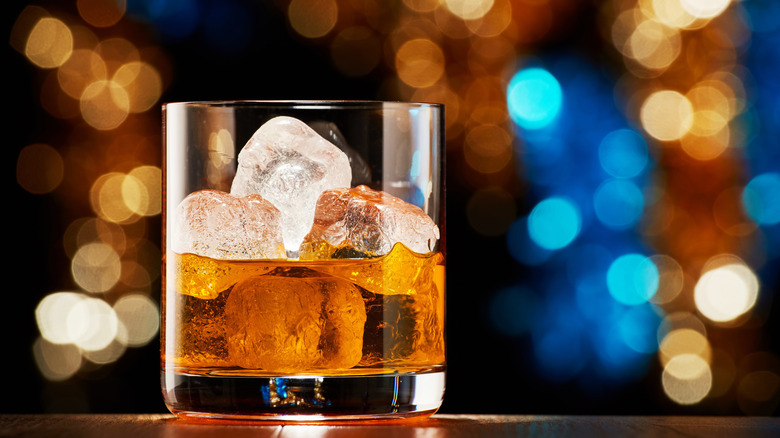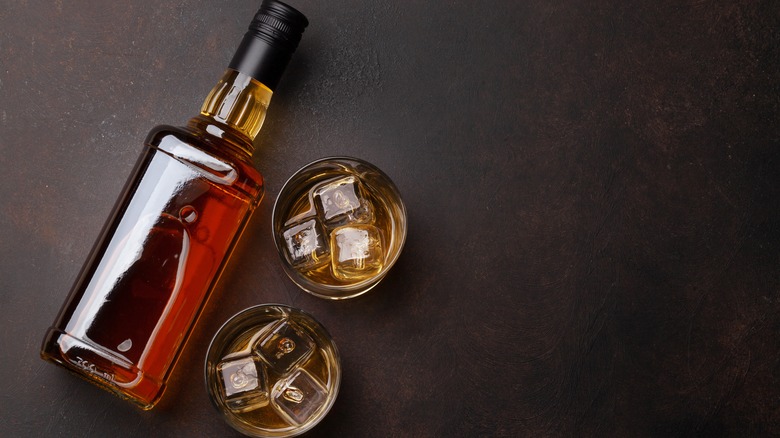You Should Know The Difference Between Scotch And Bourbon
The world of whiskey can be both confusing and fascinating. The nuances of flavor, aroma, and origin tell a story in every glass. But first, it helps to understand some basic terminology. For example, when deciding whether to order Scotch and bourbon, you may wonder what's the difference.
Both are popular and iconic whiskies. Scotch and bourbon are both grain-based spirits that are distilled and barrel-aged. Connoisseurs passionately defend the integrity of each, and there are even U.S. government and U.K. government standards requiring specific criteria for beverages claiming to be either bourbon or Scotch.
Scotch hails from Scotland, while bourbon is from the United States. But the difference goes deeper. Each carries a rich history and unique production methods that contribute to their distinct profiles. Whether you're a seasoned connoisseur or a curious beginner, understanding the differences between Scotch and bourbon can enhance your appreciation for these beloved spirits. So, pour yourself a dram and join us as we explore the differences between Scotch and bourbon.
Bourbon is made in America
Some mistakenly believe that bourbon must be made in Kentucky. However, bourbon can be made anywhere in the United States, though around 95% is made in Kentucky, according to the American Bourbon Association. So, chances are, your bourbon was made in Kentucky, but that isn't a legal requirement.
The grain used is important. Bourbon contains at least 51% corn, but additional grains, including rye, wheat, or malted barley, are often added to enhance or balance the flavor. Since bourbon's grain, or "mash," is mostly corn, bourbon usually has a sweeter flavor than Scotch or other kinds of whiskey.
It's aged in new charred oak barrels. Some varieties of whiskey include additives to enhance the color or flavor, bourbon doesn't the only additive allowed is water to fine-tune the proof. Instead, the caramel-like color comes from the barrel aging process. Bourbon stops maturing once bottled since the aging is a result of the chemical reaction that happens while in the oak barrels. There is no federal law stating bourbon must be aged for any specific time period. However, "straight bourbon" is aged for at least two years. When you compare bourbon to Scotch, the differences become clear.
Scotch is a product of Scotland
Scotch whisky is an iconic product of Scotland. In the United Kingdom, the Spirit Drink Verification Scheme verifies that products sold as Scotch meet the regulated criteria covering how it is made, marketed, and exported. There are five geographic regions associated with Scotch, including Campbeltown, Highland, Islay, Lowland, or Speyside, per the Scotch Whisky Regulations 2009.
In Scotland, the official spelling of "whisky" is without an "e" to differentiate it from "whiskey" made in Ireland and America. Most Scotch is made from malted barley, though some distillers use different grains. The only additives allowed in Scotch are water and plain caramel coloring. Scotch must be aged in oak casks or barrels for at least three years. The casks may be new, or they may have been used to age other beverages like sherry, brandy, or even tequila, per the Scotch Whisky Association. There are also additional regulations for Scotch that are sold as single malt, single grain, or blended.
Next time you sip on a glass of Scotch or bourbon, realize you're not just enjoying a drink, but the results of a rich heritage and stringent craftsmanship.


